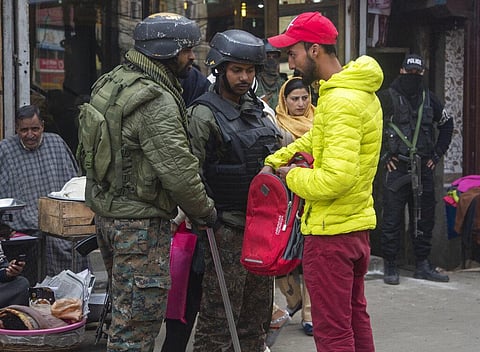

SRINAGAR: The summer capital of Jammu & Kashmir has witnessed a spurt in militant violence in the last two years and targeted killings this year. According to statistics, nine encounters, including the November 15 controversial encounter at Hyderpora, have taken place in Srinagar this year so far. Fifteen militants have been killed in these incidents.
The slain militants include The Resistance Front (TRF) chief Abbas Sheikh, who along with his deputy was killed in a gunfight in Aloochi Bagh of uptown Srinagar. In hit-and-run attacks by militants and encounters, 10 security men have also been killed this year.
At least 14 civilians, including four minority community members and two migrant workers from Bihar, have been killed in militant violence in the city this year so far. The killing of civilians has increased from 4 in 2020 to 14 in 2021.
In nine encounters in 2020, 19 militants, including Hizbul Mujahideen chief Dr Saifullah, were killed in Srinagar. Besides, 10 security men were also killed in militant attacks in Srinagar last year. According to statistics, over a dozen grenade attacks have taken place in Srinagar this year, which is higher than that of previous year.
The violence levels in 2020 and 2021 in Srinagar are higher compared to 2019, when only six persons were killed, and 2017 when 18 persons were killed in militancy-related incidents.
After the surge in militant attacks in Srinagar, security presence has been increased in the city and additional troops have taken over some marriage halls. Besides, more bunkers are being constructed and for the first time in over three decades of militancy in J&K, women CRPF personnel have been deployed in parts of Srinagar to conduct frisking of women commuters and travellers.
A security official said militants are frustrated and want to show their presence by carrying out attacks on civilians and security forces in Srinagar. He said that whenever militants are present in Srinagar and the forces get information, encounters take place.
Asked whether militants are present in Srinagar, the official said the militants are not permanently present in Srinagar. "Whenever making transit from one place to another, they temporarily stay here and then leave," he said.
He, however, said militants don't have permanent hide-outs in Srinagar. Surprisingly, Srinagar was declared a militant-free zone by police in August 2020 with zero presence of militants. "Security forces are now having the upper hand against militants in Srinagar and that is why encounters are taking place," the security official said.
Shesh Paul Vaid, who was police chief of Jammu & Kashmir from December 2016 to September 2018, said that since Srinagar is the capital city, it always attracts attention of militants. He, however, blamed thinning of troops and removal of bunkers for the spurt in militant violence in the city.
Earlier, there was security forces' domination in Srinagar but then bunkers were removed, leading to the loss of upper hand, he said adding, "It is one of the reasons why militants have been able to make hide-outs in Srinagar and carry out attacks."
Vaid said it is a battle of wits and "you can only win it when people are on your side". He advised the J&K police to build more rapport and liaison with the local population so that they can get more information about militants.
IG CRPF (Srinagar Sector) Charu Sinha said every conflict has different phases. "One has to see what kind of phase we are going through, what kind of phase the country is going through and the place is going through and what are the external factors which affect it," she said.